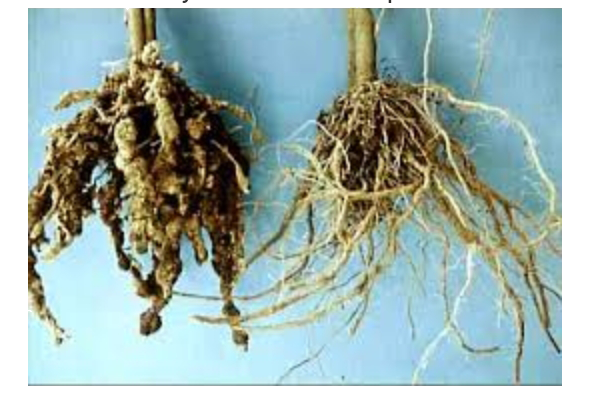Choose the nematode which infects the roots of tobacco plants causing a great reduction in yield.
(a) A. tumefaciens
(b) M. incognita
(c) S. typhimurium
(d) B. thuringiensis
A. tumefaciens
M. incognita
S. typhimurium
B. thuringiensis
To solve the question about which nematode infects the roots of tobacco plants and causes a significant reduction in yield, we can follow these steps:
1. Understand the Question: The question asks for a specific nematode that affects tobacco plants and reduces their yield.
2. Identify the Options: The options provided are:
- (a) A. tumefaciens
- (b) M. incognita
- (c) S. typhimurium
- (d) B. thuringiensis
3. Define Nematodes: Nematodes are a group of roundworms that belong to the phylum Nematoda. They are commonly found in soil and can affect various plants.
4. Analyze Each Option:
- (a) A. tumefaciens: This is a bacterium, not a nematode, and is known for causing crown gall disease in plants.
- (b) M. incognita: This is a nematode known as Meloidogyne incognita, which specifically infects the roots of many plants, including tobacco, leading to reduced yield.
- (c) S. typhimurium: This is a bacterium associated with foodborne illness, not a nematode.
- (d) B. thuringiensis: This is a bacterium used as a biological pesticide, not a nematode.
5. Select the Correct Answer: Based on the analysis, the correct answer is (b) M. incognita, as it is the only nematode listed that is known to infect tobacco roots and reduce yield.
Final Answer:
(b) M. incognita
---
- (a) A. tumefaciens
- (b) M. incognita
- (c) S. typhimurium
- (d) B. thuringiensis
- (a) A. tumefaciens: This is a bacterium, not a nematode, and is known for causing crown gall disease in plants.
- (b) M. incognita: This is a nematode known as Meloidogyne incognita, which specifically infects the roots of many plants, including tobacco, leading to reduced yield.
- (c) S. typhimurium: This is a bacterium associated with foodborne illness, not a nematode.
- (d) B. thuringiensis: This is a bacterium used as a biological pesticide, not a nematode.
(b) M. incognita
Topper's Solved these Questions
Similar Questions
Knowledge Check
Which one of the following bacteria is used for production of transgenic plants ?
(a) Escherichia coli
(b) Bacillus subtillis
(c) Staphyloccoccus aureus
(d) Agrobacterium tumefaciensAEscherichia coliBBacillus subtillisCStaphyloccoccus aureusDAgrobacterium tumefaciens
Which of the following nematode infects the roots of tobacco plant and causes a great reduction in yield.
View SolutionA parasitic nematode that causes a great reduction in yield of tobacco crop is
View SolutionObserve the picture given below and identify the disease-causing nematode that causes a great reduction in yield of tobacco plants

View SolutionWho demonstrated that the extract of the infected plants of tobacco could cause infection in healthy plants ?
(a) Pasteur
(b) M.W. Beijerinek
(c) D.J. Ivanowsky
(d) W.M. Stanley
View Solution(a) Name the nematode that infects and damages tobacco roots.
(b) How are transgenic tobacco plants producced to solve this problem ?
View Solution(a) Name the nematode that infects and damages tobacco roots.
(b) How are transgenic tobacco plants producced to solve this problem ?
View SolutionSeveral nematodes parasitise a wide variety of plants and animals including ______ . A nematode Meloidegyne incognitia infects the ______ of tobacco plants and causes a great reduction in yield :
View Solution
